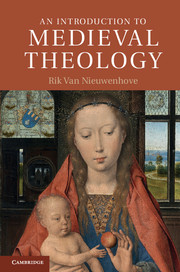Book contents
- Frontmatter
- Contents
- Abbreviations
- Chapter 1 Introduction
- Part I The legacy of the Fathers
- Part II Early medieval theologians
- Part III The eleventh and twelfth centuries
- Chapter 6 Introduction
- Chapter 7 Anselm of Canterbury
- Chapter 8 Monks and scholars in the twelfth century
- Chapter 9 Hugh of St. Victor
- Chapter 10 Richard of St. Victor
- Chapter 11 Peter Lombard and the systematization of theology
- Part IV The thirteenth century
- Part V The fourteenth century and beyond
- Bibliography
- Index
- References
Chapter 11 - Peter Lombard and the systematization of theology
Published online by Cambridge University Press: 05 June 2012
- Frontmatter
- Contents
- Abbreviations
- Chapter 1 Introduction
- Part I The legacy of the Fathers
- Part II Early medieval theologians
- Part III The eleventh and twelfth centuries
- Chapter 6 Introduction
- Chapter 7 Anselm of Canterbury
- Chapter 8 Monks and scholars in the twelfth century
- Chapter 9 Hugh of St. Victor
- Chapter 10 Richard of St. Victor
- Chapter 11 Peter Lombard and the systematization of theology
- Part IV The thirteenth century
- Part V The fourteenth century and beyond
- Bibliography
- Index
- References
Summary
Peter Lombard was born in Northern Italy, perhaps in Novarra. We first encounter a reference to him in a brief Letter by St. Bernard of Clairvaux (dating from around 1138), in which he commends Peter to Gilduin, abbot of St. Victor in Paris. Here Peter found a vibrant center of intellectual activity, and he was to stay in Paris for the remainder of his life. He embarked on a successful ecclesiastic career, even becoming bishop of Paris shortly before his death in July 1160.
Peter is best known for his work The Sentences, consisting of four parts (or “Books”). The Sentences is a work which is very much at the service of the Church and the defence of faith (Prologue 1–4). Peter states that his aim was to write a book which brings together the views of the Fathers in a collection of “sentences,” so that “the one who seeks them shall find it unnecessary to rifle through numerous books” (Prologue 5). Giulio Silano makes the point that The Sentences may be compared to a legal casebook: jurisprudence is unapologetic (its relevance is not disputed); and it draws on authorities to settle legal difficulties. Similarly, Peter’s Sentences are an invitation to students of theology to engage in theology, and draw on important theological authorities to solve theological issues. The main goal of The Sentences is therefore to draw students into the theological discipline, and pass on skills necessary to pass sound theological judgements when confronted with theological difficulties.
- Type
- Chapter
- Information
- An Introduction to Medieval Theology , pp. 147 - 166Publisher: Cambridge University PressPrint publication year: 2012



